Related Research Articles

The Order of Preachers, also known as the Dominican Order, is a Roman Catholic mendicant order of pontifical right that was founded in France by a Castilian priest named Dominic de Guzmán. It was approved by Pope Honorius III via the papal bull Religiosam vitam on 22 December 1216. Members of the order, who are referred to as Dominicans, generally display the letters OP after their names, standing for Ordinis Praedicatorum, meaning 'of the Order of Preachers'. Membership in the order includes friars, nuns, active sisters, and lay or secular Dominicans. More recently, there has been a growing number of associates of the religious sisters who are unrelated to the tertiaries.
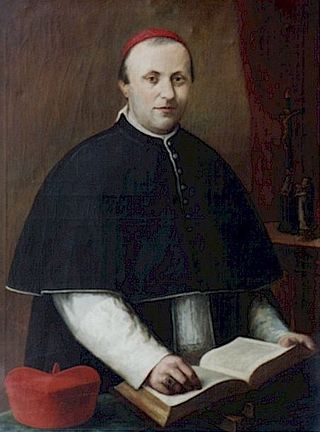
Tommaso Maria Zigliara, OP was a Corsican priest of the Catholic Church, a member of the Dominicans, a theologian, philosopher and a cardinal.

The Pontifical University of Saint Thomas Aquinas (PUST), also known as the Angelicum in honor of its patron the Doctor Angelicus Thomas Aquinas, is a pontifical university located in the historic center of Rome, Italy. The Angelicum is administered by the Dominican Order and is the order's central locus of Thomist theology and philosophy.
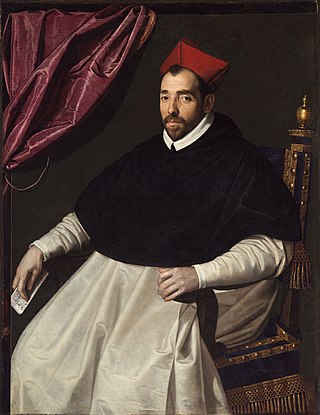
Michele Bonelli, Cardinal Alessandrino was an Italian senior papal diplomat with a distinguished career that spanned two decades from 1571.
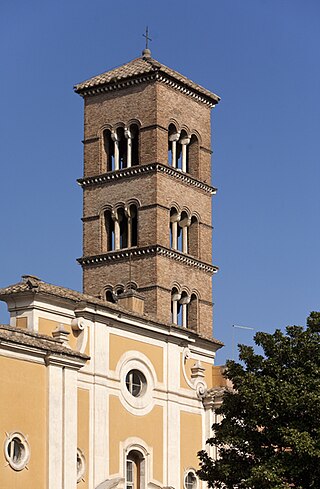
The Basilica of San Sisto Vecchio is one of the over sixty minor basilicas among the churches of Rome, and a titular church since 600 AD. As such, it is connected to the title of a Cardinal priest, currently Antoine Kambanda.

Nicolò Albertini, O.P., was an Italian Dominican friar, statesman, and cardinal.
In the Roman Catholic Church, Theologian of the Pontifical Household is a Roman Curial office which has always been entrusted to a Friar Preacher of the Dominican Order and may be described as the pope's theologian. The title was formerly known as the Master of the Sacred Apostolic Palace before the changes implemented in Pope Paul VI's 1968 apostolic letter Pontificalis Domus.

Mario Luigi Ciappi, O.P. was an Italian Cardinal of the Roman Catholic Church who served as personal theologian to five popes from 1955 to 1989, and was elevated to the cardinalate in 1977.
Jerónimo Xavierre was a Spanish Dominican theologian.

John Slotanus was a Dutch Roman Catholic polemical writer. He lived and worked most of his life in Cologne.
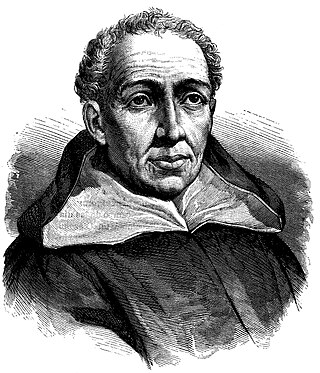
Tomás de Lemos (Thomas) was a Spanish Dominican theologian and controversialist.
Lancelotto Politi was an Italian Dominican canon lawyer, theologian and bishop.
John-Baptist Hackett was an Irish Catholic theologian.
Sisto Fabri was a theologian and canon lawyer of the Dominican Order who was appointed Master of the Sacred Palace by Pope Gregory XIII serving from 1580 to 1583, and Master of the Order of Preachers from 1583 to 1589.
Michele Mazzarino, or Mazzarini, also known as Michel Mazarin, was an Italian Cardinal and statesman in the service of France.
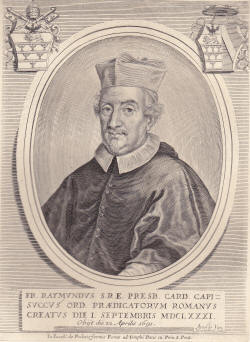
Raimondo Capizucchi was a Roman nobleman, Dominican friar, appointed a cardinal by Pope Innocent XI.
Vincenzo Candido (1573–1654), baptised Mario, was a vicar general of the Dominican Order.
Diego Álvarez was a Spanish theologian who opposed Molinism. He was archbishop of Trani from 1607 to his death.
Egidio Foscarari O.P. was an Italian Dominican theologian who was Bishop of Modena (1550-1564).
References
![]() This article incorporates text from a publication now in the public domain : Herbermann, Charles, ed. (1913). "Dominic Gravina". Catholic Encyclopedia . New York: Robert Appleton Company.
This article incorporates text from a publication now in the public domain : Herbermann, Charles, ed. (1913). "Dominic Gravina". Catholic Encyclopedia . New York: Robert Appleton Company.
- 1 2 "Gravina, Domenico nell'Enciclopedia Treccani". Treccani.it. Retrieved 5 November 2018.
- ↑ Döllinger, Johann Joseph Ignaz von; Reusch, Franz Heinrich (5 November 1889). "Geschichte der moralstreitigkeiten in der römisch-katholischen kirche seit dem sechzehnten jahrhundert: mit beiträgen zur geschichte und charakteristik des Jesuitenordens. Auf grund ungedruckter aktenstücke". C.H. Beck. p. 309. Retrieved 5 November 2018– via Google Books.
- ↑ Cargnoni, Costanzo (5 November 2018). Storia della spiritualità italiana. Città Nuova. p. 375. ISBN 9788831192675 . Retrieved 5 November 2018– via Google Books.